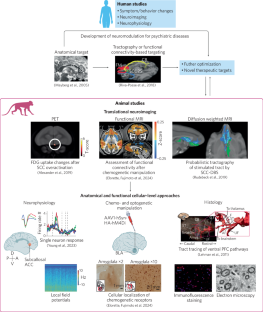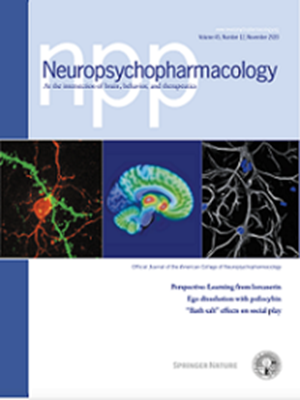What can neuroimaging of neuromodulation reveal about the basis of circuit therapies for psychiatry?
IF 6.6
1区 医学
Q1 NEUROSCIENCES
引用次数: 0
Abstract
Neuromodulation is increasingly becoming a therapeutic option for treatment resistant psychiatric disorders. These non-invasive and invasive therapies are still being refined but are clinically effective and, in some cases, provide sustained symptom reduction. Neuromodulation relies on changing activity within a specific brain region or circuit, but the precise mechanisms of action of these therapies, is unclear. Here we review work in both humans and animals that has provided insight into how therapies such as deep brain and transcranial magnetic stimulation alter neural activity across the brain. We focus on studies that have combined neuromodulation with neuroimaging such as PET and MRI as these measures provide detailed information about the distributed networks that are modulated and thus insight into both the mechanisms of action of neuromodulation but also potentially the basis of psychiatric disorders. Further we highlight work in nonhuman primates that has revealed how neuromodulation changes neural activity at different scales from single neuron activity to functional connectivity, providing key insight into how neuromodulation influences the brain. Ultimately, these studies highlight the value of combining neuromodulation with neuroimaging to reveal the mechanisms through which these treatments influence the brain, knowledge vital for refining targeted neuromodulation therapies for psychiatric disorders.


神经调控的神经影像学能揭示精神病学回路疗法的基础是什么?
神经调控正日益成为治疗耐药性精神障碍的一种疗法。这些非侵入性和侵入性疗法仍在不断完善中,但临床效果显著,在某些情况下还能持续减轻症状。神经调节依赖于改变特定脑区或脑回路内的活动,但这些疗法的确切作用机制尚不清楚。在此,我们回顾了在人类和动物身上开展的研究,这些研究深入探讨了脑深部刺激和经颅磁刺激等疗法如何改变整个大脑的神经活动。我们重点关注将神经调控与正电子发射计算机断层显像(PET)和核磁共振成像(MRI)等神经影像学技术相结合的研究,因为这些测量方法可以提供有关被调控的分布式网络的详细信息,从而深入了解神经调控的作用机制以及精神疾病的潜在基础。此外,我们还重点介绍了在非人灵长类动物身上开展的工作,这些工作揭示了神经调控是如何在从单个神经元活动到功能连接等不同尺度上改变神经活动的,从而为了解神经调控是如何影响大脑提供了重要依据。最终,这些研究凸显了神经调控与神经影像学相结合的价值,揭示了这些疗法影响大脑的机制,这些知识对于完善针对精神疾病的神经调控疗法至关重要。
本文章由计算机程序翻译,如有差异,请以英文原文为准。
求助全文
约1分钟内获得全文
求助全文
来源期刊

Neuropsychopharmacology
医学-精神病学
CiteScore
15.00
自引率
2.60%
发文量
240
审稿时长
2 months
期刊介绍:
Neuropsychopharmacology is a reputable international scientific journal that serves as the official publication of the American College of Neuropsychopharmacology (ACNP). The journal's primary focus is on research that enhances our knowledge of the brain and behavior, with a particular emphasis on the molecular, cellular, physiological, and psychological aspects of substances that affect the central nervous system (CNS). It also aims to identify new molecular targets for the development of future drugs.
The journal prioritizes original research reports, but it also welcomes mini-reviews and perspectives, which are often solicited by the editorial office. These types of articles provide valuable insights and syntheses of current research trends and future directions in the field of neuroscience and pharmacology.
 求助内容:
求助内容: 应助结果提醒方式:
应助结果提醒方式:


